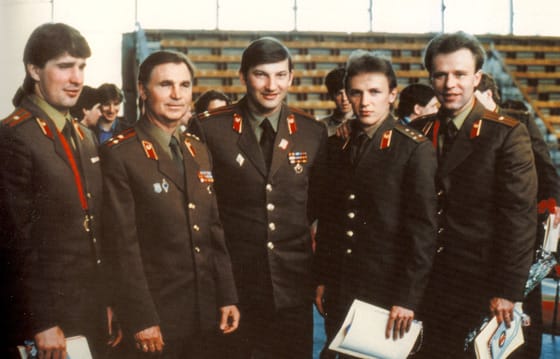Hockey's greatest five-man line belonged not to Canada, but the U.S.S.R.
Today, it's Russia, and in Gabe Polsky's film, the players of the Red Army team look back at past championships. They also revisit their bitterness towards a tyrannical coach and system that eventually destroyed Communist Europe. Polsky's winning documentary transcends mere sports to explore Cold War politics and personal betrayals; Red Army is a film for fans of documentaries and hockey alike.
The documentary is told through its charismatic captain, Slava Fetisov. Fiery, funny, cantankerous and candid, Fetisov is the perfect guide to lead audiences through the rise of his team. The Red Army was born in the 1950s to glorify Soviet Communism, but the true father of Soviet hockey was coach Anatoli Tarasov. Tarasov embraced the strategy of chess with the grace of the Bolshoi to design intricate passing systems that literally skated circles around Western opponents. Stock footage of games from the late '70s show the Red Army bulldozing NHL's best teams, leaving Gretzky and Phil Esposito shaking their heads.
Despite his team's international victories, Tarasov fell out of favour with the Soviet Army, who replaced him with KGB crony Viktor Tikhonov. Tikhonov burned out his players with endless practices and zero compassion (forbidding them from attending family funerals). The players' disillusionment ran parallel with the malaise that gripped Soviet society, which crumbled in the late '80s.
The film then turns into a David and Goliath battle between Fetisov and Tikhonov, who refused to let his star play in the NHL unless he surrendered 90 percent of his Western earnings. When Fetisov balked, Tikhonov blacklisted the national hero. Only after the U.S.S.R. collapsed in 1991 did Fetisov play in the NHL, but he found it hard to adjust to goonish North American players and hostile fans. Fetisov's journey would take him to Detroit, where legendary coach Scotty Bowman allowed him and other Russian expats to play their style of game again.
Bowman's interviews offer the admiring North American perspective, but the film belongs to Fetisov and his Red Army teammates. Their recollections are warm, emotional yet frank. It's a cliché, but the Red Army were brothers on and off the ice. They played as one unit, celebrating two Olympic golds and seven world championships, but enduring near-slavery under the oppressive Soviet system. Polsky uses graphics and animation to energize his film, and carefully deploys hockey clips to illustrate his story without smothering it.
Red Army takes viewers on an exciting but difficult journey where the biggest battles were fought as much off the ice as on.
(Mongrel Media)Today, it's Russia, and in Gabe Polsky's film, the players of the Red Army team look back at past championships. They also revisit their bitterness towards a tyrannical coach and system that eventually destroyed Communist Europe. Polsky's winning documentary transcends mere sports to explore Cold War politics and personal betrayals; Red Army is a film for fans of documentaries and hockey alike.
The documentary is told through its charismatic captain, Slava Fetisov. Fiery, funny, cantankerous and candid, Fetisov is the perfect guide to lead audiences through the rise of his team. The Red Army was born in the 1950s to glorify Soviet Communism, but the true father of Soviet hockey was coach Anatoli Tarasov. Tarasov embraced the strategy of chess with the grace of the Bolshoi to design intricate passing systems that literally skated circles around Western opponents. Stock footage of games from the late '70s show the Red Army bulldozing NHL's best teams, leaving Gretzky and Phil Esposito shaking their heads.
Despite his team's international victories, Tarasov fell out of favour with the Soviet Army, who replaced him with KGB crony Viktor Tikhonov. Tikhonov burned out his players with endless practices and zero compassion (forbidding them from attending family funerals). The players' disillusionment ran parallel with the malaise that gripped Soviet society, which crumbled in the late '80s.
The film then turns into a David and Goliath battle between Fetisov and Tikhonov, who refused to let his star play in the NHL unless he surrendered 90 percent of his Western earnings. When Fetisov balked, Tikhonov blacklisted the national hero. Only after the U.S.S.R. collapsed in 1991 did Fetisov play in the NHL, but he found it hard to adjust to goonish North American players and hostile fans. Fetisov's journey would take him to Detroit, where legendary coach Scotty Bowman allowed him and other Russian expats to play their style of game again.
Bowman's interviews offer the admiring North American perspective, but the film belongs to Fetisov and his Red Army teammates. Their recollections are warm, emotional yet frank. It's a cliché, but the Red Army were brothers on and off the ice. They played as one unit, celebrating two Olympic golds and seven world championships, but enduring near-slavery under the oppressive Soviet system. Polsky uses graphics and animation to energize his film, and carefully deploys hockey clips to illustrate his story without smothering it.
Red Army takes viewers on an exciting but difficult journey where the biggest battles were fought as much off the ice as on.




